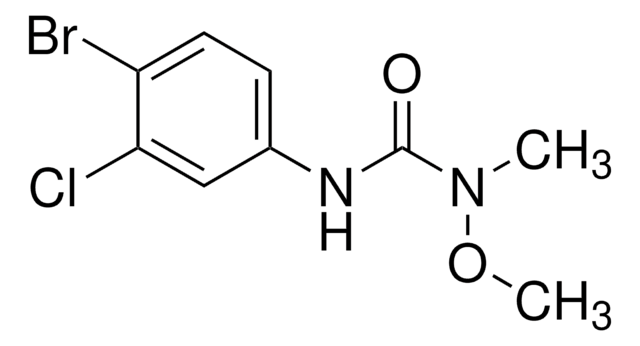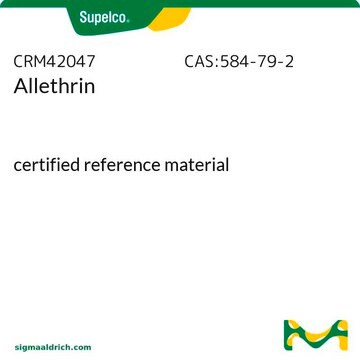推荐产品
等級
certified reference material
TraceCERT®
品質等級
產品線
TraceCERT®
儲存期限
limited shelf life, expiry date on the label
製造商/商標名
Manufactured by: Sigma-Aldrich Production GmbH, Switzerland
SMILES 字串
CC(C)OC(=O)C(O)(c1ccc(Br)cc1)c2ccc(Br)cc2
InChI
1S/C17H16Br2O3/c1-11(2)22-16(20)17(21,12-3-7-14(18)8-4-12)13-5-9-15(19)10-6-13/h3-11,21H,1-2H3
InChI 密鑰
FOANIXZHAMJWOI-UHFFFAOYSA-N
正在寻找类似产品? 访问 产品对比指南
一般說明
This certified reference material (CRM) is produced and certified in accordance with ISO/IEC 17025 and ISO 17034. This CRM is traceable to primary material from an NMI, e.g. NIST or NMIJ.
Certified content by quantitative NMR incl. uncertainty and expiry date are given on the certificate.
Download your certificate at: http://www.sigma-aldrich.com
Bromopropylate is a nonsystemic and nonpenetrating acaricide that remains on the peel of fruits and does not migrate into the pulp. It belongs to the family of organophosphate pesticides and is used in the cultivation of lemon trees and other crops. Bromopropylate primarily acts by interfering with the respiratory system. It affects the mitochondria by inhibiting key enzymatic activities and ATP generation, which leads to the formation of reactive oxygen species, and destroys proteins, membranes, unsaturated fatty acids, DNA, etc.
Bromopropylate has to be monitored in the Multiannual Control Programme for Pesticides Residues (MACP), run within the EU and EFTA in/on products of plant origin.
The use of bromopropylate has been banned across the European Union. Maximum residue levels (MRLs) have been set according to Reg. (EU) No 310/2011 for bromopropylate for various products of plant and animal origin from 0.01 to 0.05 mg/kg.
Certified content by quantitative NMR incl. uncertainty and expiry date are given on the certificate.
Download your certificate at: http://www.sigma-aldrich.com
Bromopropylate is a nonsystemic and nonpenetrating acaricide that remains on the peel of fruits and does not migrate into the pulp. It belongs to the family of organophosphate pesticides and is used in the cultivation of lemon trees and other crops. Bromopropylate primarily acts by interfering with the respiratory system. It affects the mitochondria by inhibiting key enzymatic activities and ATP generation, which leads to the formation of reactive oxygen species, and destroys proteins, membranes, unsaturated fatty acids, DNA, etc.
Bromopropylate has to be monitored in the Multiannual Control Programme for Pesticides Residues (MACP), run within the EU and EFTA in/on products of plant origin.
The use of bromopropylate has been banned across the European Union. Maximum residue levels (MRLs) have been set according to Reg. (EU) No 310/2011 for bromopropylate for various products of plant and animal origin from 0.01 to 0.05 mg/kg.
應用
The certified reference material (CRM) is intended to be used as a calibrant for chromatography and other analytical techniques. Bromopropylate CRM may also find following uses:
- To elucidate the inhibition of plasma and brain acetylcholinesterase activity in Wistar rats with a mixture of 5 pesticides: chlorpyrifos, alphacypermetrin, bromopropylate, carbendazim, and mancozeb
- Study the degradation processes of bromopropylate, coumaphos, chlordimeform, cymiazole, flumethrin, and fluvalinate in aqueous media by HPLC
- To develop a liquid-phase microextraction method using deep eutectic solvent for extraction and preconcentration of diazinon, metalaxyl, bromopropylate, oxadiazon, and fenazaquin pesticides from samples such as grape and sour cherry juices, fresh beet, cucumber, potato, and tomato followed by gas chromatography-flame ionization detection
- To develop a multi-residue method for the determination of azinphos methyl, bromopropylate, chlorpyrifos, dimethoate, parathion methyl, and phosalone in apricots and peaches using negative chemical ionization ion trap technology
- Simultaneous determination of amitraz, bromopropylate, coumaphos, cymiazole, and fluvalinate residues in honey by solid-phase extraction and GC-MS
推薦產品
Find a digital Reference Material for this product available on our online platform ChemisTwin® for NMR. You can use this digital equivalent on ChemisTwin® for your sample identity confirmation and compound quantification (with digital external standard). An NMR spectrum of this substance can be viewed and an online comparison against your sample can be performed with a few mouseclicks. Learn more here and start your free trial.
法律資訊
TraceCERT is a registered trademark of Merck KGaA, Darmstadt, Germany
未找到合适的产品?
试试我们的产品选型工具.
訊號詞
Warning
危險聲明
危險分類
Aquatic Acute 1 - Aquatic Chronic 1
儲存類別代碼
11 - Combustible Solids
水污染物質分類(WGK)
WGK 3
閃點(°F)
Not applicable
閃點(°C)
Not applicable
H Jacobsen et al.
Food and chemical toxicology : an international journal published for the British Industrial Biological Research Association, 42(8), 1269-1277 (2004-06-23)
Six dose groups of 8 male and female rats respectively received a daily dose equivalent to 0, 0.15, 0.006, 0.03, 0.15 or 0.3 mg/kg b.w./day chlorpyrifos (groups 1-6) and the last four dose groups (groups 3-6) received in addition daily
Konstantinos S Liapis et al.
Journal of chromatography. A, 996(1-2), 181-187 (2003-07-02)
A rapid, selective and sensitive multi-residue method for the determination of six common pesticides in stone fruit samples is described. The proposed method involves the extraction of the pesticides with the use of acetone solvent followed by liquid-liquid partition with
Javier Ramón-Azcón et al.
Journal of agricultural and food chemistry, 57(2), 375-384 (2008-12-31)
This paper reports for the first time the development of an immunoassay for the analysis of the miticide bromopropylate (BP). The chemical structure of the immunizing haptens was designed to maximize the recognition of the bis-bromophenyl group of BP. Thus
E Corta et al.
Talanta, 52(2), 169-180 (2008-10-31)
Degradation processes of bromopropylate, coumaphos, chlordimeform, cymiazole, flumethrin and fluvalinate in aqueous media have been studied by HPLC. Cymiazole is stable at any tested pH (1-11), while bromopropylate, flumethrin and coumaphos are unstable at basic pH and chlordimeform and fluvalinate
Konstantinos S Liapis et al.
Journal of chromatography. A, 996(1-2), 181-187 (2003-07-02)
A rapid, selective and sensitive multi-residue method for the determination of six common pesticides in stone fruit samples is described. The proposed method involves the extraction of the pesticides with the use of acetone solvent followed by liquid-liquid partition with
我们的科学家团队拥有各种研究领域经验,包括生命科学、材料科学、化学合成、色谱、分析及许多其他领域.
联系技术服务部门








